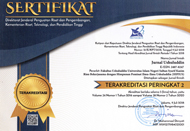Imam Al-Ṭabarī’s Analysis of the Polemic Position of Basmala in Surah Al-Fatihah: A Study of Paradoxical Views
Abstract
Keywords
Full Text:
PDFReferences
Al-‘Arabī, Ibn. Aḥkām Al-Qur’ān. Bairut: Dār al-Fikri, 1972.
Al-‘Ayid, Ibn al-Dhaqīq. Sharḥ Al-Arba‘īn Al-Nawaāwī Fi- Al-Ahādith Al-Ṣaḥīḥah Al-Nabawiyah. Libanon: Mu’asasah al-Riyān, 2003.
Al-Al-Dharqānī, Muḥammad ‘Abd ‘Ādhīm. Manāhil Al-‘Irfān Fī Ulūm Al-Qur’Ān. Bairut: Dār al-Kitāb al-‘Arābī, 1995.
Al-Dhahabī, Muḥammad Ḥusayn. Al-Ittijāhāt Al-Munkharifah Fi Tafsīr Al-Qur’ān Al-Karīm: Dawāfi‘uhā Wa Daf‘Uha. Kairo: Maktabah Wahbiyah, 1986.
———. Tafsīr Wa- Al-Mufassirūn. Cairo: Maktabah Wahbah, 2000.
Al-Fansiyān, Su‘ūd bin Abdullah. Ikhtilāf Al-Mufassirīn: Asbābuhu Wa Athāruhu. Riyāḍ: Dār Ishbiliyā, 1997.
Al-Ḥasanāwī, Ṣālaḥ al-Dīn. Al-Ṭabarī: Ḥayātuhu Wa-Manhayatuhu Fi- Al-Tafsīr. Maroko: Chouaib Doukkali University, 2015.
Al-Qaṭān, Mannā‘. Mabāhith Fi ‘Ulūm Al-Qur’Ān. Kairo: Maktabah Wahbah, n.d.
Al-Qurṭuby, Abi ʽAbdillah Muhammad bin Ahmad al-Anṣāry. Jāmiʽ Al-Aḥkām Al-Qurān. Bairut: Muassah al-Risalah, 2006.
Al-Rāzī, Muḥammad Fakhruddin. Mafātiḥ Al-Ghayb. Bairut: Dār al-Fikri, 1981.
Al-Rūmī, Fahd ‘Abd al-Raḥmān. Darāsātun Fi-‘Ulūm Al-Qur’Ān Al-Karīm. Riyāḍ: Tafsir Center for Qur’anic Studies, 2005.
Al-Ṣābūnī, ‘Alī. Al-Tibyān Fi-‘Ulūm Al-Qur’Ān. Kairo: Dār al-Iḥsān, 2003.
———. Rawā‘i Al-Bayān Tafsīr Āyāt Al-Aḥkām Min Al-Qur’Ān. Demaskus: Maktabah al-Ghazālī, 1980.
Al-Ṣāliḥ, Ṣubḥī. Mabāḥith Fi-‘Ulūm Al-Qur’Ān. Bairut: Dār al-‘Ālam li-Malāyīn, 2000.
Al-Ṭabarī, Abū Ja‘far Muḥammad Jarīr. Jāmi‘ Al-Bayān ‘an Ta’Wīl Āy Al-Qurān. Kairo: Markaz li Baḥūṯ wa- al-Darāsāt al-‘Arabiyah wa- al-Islāmiyah, 2001.
Al-Zamakhsharī, Maḥmud bin Umar bin Aḥmad. Al-Kashāf ’an Ḥaqāiq Ġawāmiḍ Al-Tanzīl Fi-Wujūh Al-Ta’wīl. Riyāḍ: Jami‘ al-Huqu Maḥfuẓah li al-Nāsh, 1998.
Arif, Syamsuddin, and Dinar Dewi Kania. “Filsafat Islam Dan Tradisi Keilmuan Islam.” In Filsafat Ilmu: Perspektif Barat Dan Islam. Jakarta: Gema Insani, 2013.
Baldick, Chris. The Oxford Dictionary of Literary Terms. New York: Oxford University Press, 2008.
Berg, Herbert. The Development of Exegesis in Early Islam: The Authenticity of Muslim Literature from the Formative Period. London and New York: Routledge, 2005.
Bhat, Samee-Ullah. “The Life and Work of Muhammad Ibn Jarir Al-Tabari.” Khazanah Pendidikan Islam 4, no. 1 (2022).
Böwering, Gerhard, and Yousef Casewit, eds. A Qur’ān Commentary by Ibn Barrajān of Seville (d.536/1141): Iḍāḥ Al-Ḥikmah Bi-Aḥkāmal-‘ibra (Wisdom Deciphered, the Unseen Discovered). Leiden: Brill, 2015.
Darwazah, Muḥammad ‘Izzah. Al-Tafsīr Al-Ḥadīth Tartīb Al-Suwar Ḥasabi Al-Nuzūl. Bairut: Dār al-Ġarb al-Islāmiyah, 2000.
Ebraḥīmi, Fatemeh Dastranj, and Fereidoun Rezaei. “Analytical-Critical Review of the Narration of Silent Recitation of the Basmalah in the Quranic Chapters by Imam Ali (AS).” A Research Journal on Qur’anic Knowledge 15, no. 56 (2024).
Hafizi, Nor, Fatimah Zaharah, Mohd A’tarahim, Moh Faiz Hakimi, and Ahmad Fauzi. “The Personality of Al-Tabari and His Expertise in The Field of Al-Quran And Qiraat.” International Journal of Academic Research in Business and Social Sciences 10, no. 9 (2020).
Hanafi, Hasan. “Method of Thematic Interpretation of the Qur’an.” In The Qur’an as Text, edited by Stefan Wild. Leiden: Brill, 1996.
Iyāzī, al-Sayyid Muḥammad ‘Alī. Al-Mufassirūn Ḥayātuhum Wa-Manhajuhum. Tehran: Wazārah al-Thaqāfah wa- al-Irshād al-Islāmī, 1967.
Lala, Ismail. “An Analysis of the Sources of Interpretation in the Commentaries of Al-Tabari, Al-Zamakhshari, Al-Razi, Al-Qurtubi, and Ibn Kathir.” Centre of Quranic Research International Journal 2, no. 1 (2012).
Ma‘rifah, Muḥammad Hādī. Al-Tafsīr Wa- Al-Mufassirūn Fi-Ṯawbih Al-Qašīb. Nablus: al-Jāmi‘ah al-Ḍūwiyah li- al-‘Ulūm al-Islāmiyah, 2005.
Madjid, Nurcholis. “Living the Morals of Allah." In The Complete Works of Nurcholis Madjid: Keislaman, Keindonesiaan, Kemoderenan, edited by Budhy Munawar-Rachman. Jakarta: Nurcholis Madjid Society, 2020.
Mårtensson, Ulrika. “Al-Tabari’s Concept of the Qur’an: A Systemic Analysis.” Journal of Qur’anic Studies 18, no. 2 (2016).
McAulffe, Jane Dammen. “Quranic Hermeneutics: The Views of Al-Ṭabarī and Ibn Kathīr.” In Approaches to the History of Interpretation of the Qur’an, edited by Andrew Rippin. Gorgia: Gorgia Press, 2013.
Muḥaysin, Muḥammad Sālim. Tārikh Al-Qur’ān Al-Karīm. Alexandria: Mu’assasah Shabāb al-Jāmi‘ah, 2007.
Riḍa, Muhammad Rashid. Tafsīr Al-Manār. Kairo: Dār al-Manār, 1979.
Rosenthal, Franz. The History of Al-Tabari: General Introduction and From the Creation to the Flood. New York: State University of New York Press, 1989.
Sainsbury, R. M. Paradoxes. New York: Cambrigde University Press, 2009.
Saleh, Walid A. “Preliminary Remarks on the Historiography of Tafsīr in Arabic: A History of the Book Approach.” Journal of Qur’anic Studies 12, no. 1–2 (2010): 6–40.
———. The Formation of the Classical Tradition: The Qur’ān Commentary of Al-Tha‘labī (d. 427/1035). Baston: Brill, 2004.
Sambo, Abdulkadir Ayodele. “The Methods of Research Used by Ibn Jarir Al-Tabari in His Qur’anic Exegesis.” International Conference on Humaties, Literature and Management (2015).
Shihab, M. Quraish. Tafsir Al-Misbah. Jakarta: Lentera Hati, 2005.
Shuhbah, Muḥammad Abū. Al-Madākhil Li Dirāsah Al-Qur’ān. Kairo: Maktabah al-Sunnah, 2003.
Usmani, Muhammad Taqi. The Meaning of the Noble Qur’an. Karachi: Maktabah Ma’ariful Qur’an, 2010.
Wymann-Landgraf, Umar F. Abd-Allah. Mālik and Medina: Islamic Legal Reasoning in the Formative Periode. Leiden: Brill, 2013.
Zahid, Moh. “Implications of the Debate on Basmalah for the Authenticity of the Qur'an.” al-Ihkam 10, no. 2 (2015).
DOI: http://dx.doi.org/10.24014/jush.v33i1.36041
Refbacks
- There are currently no refbacks.
 Jurnal Ushuluddin Indexed By:
Jurnal Ushuluddin Indexed By:
Alamat Redaksi:
 Fakultas Ushuluddin UIN SUSKA Riau Jl. H.R. Soebrantas KM. 15,5 Panam – Pekanbaru
Fakultas Ushuluddin UIN SUSKA Riau Jl. H.R. Soebrantas KM. 15,5 Panam – Pekanbaru
 E-mail: jurnal.ushuluddin@uin-suska.ac.id
E-mail: jurnal.ushuluddin@uin-suska.ac.id
ejournal: http://ejournal.uin-suska.ac.id/index.php/ushuludin

Jurnal Ushuluddin is licensed under a Lisensi Creative Commons Atribusi 4.0 Internasional.

















